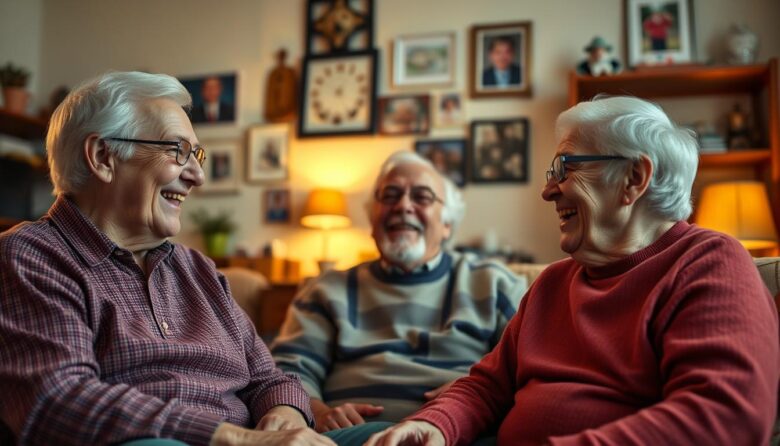Laughter is more than a fleeting moment of joy—it’s a universal language that bridges generations. For older adults, shared humor offers measurable physical and emotional benefits, from reducing stress to improving social engagement. Caregivers and loved ones increasingly recognize its power to transform routine interactions into meaningful exchanges.
Medical experts now view lighthearted moments as a legitimate therapeutic tool. Studies show laughter stimulates endorphin release, lowers blood pressure, and fosters resilience during challenging care scenarios. When used thoughtfully, it shifts care dynamics from transactional to deeply human.
Creating these connections requires cultural awareness and adaptability. A well-timed joke or nostalgic reference can spark joy, but preferences vary widely. The key lies in observing individual communication styles while respecting personal boundaries.
This approach doesn’t just benefit seniors—caregivers also experience reduced burnout and heightened fulfillment. By prioritizing moments of levity, relationships evolve beyond basic support into shared experiences that enrich both lives.
Understanding Humor in Elderly Care
Laughter’s role in senior care extends beyond joy, offering measurable health improvements. Research in Geriatrics & Gerontology International shows structured humor activities boost well-being by 34% in older adults. These interactions trigger biological responses that enhance both physical and emotional wellness.
The Emotional and Physical Benefits of Laughter
Laughter releases endorphins, the body’s natural painkillers. This chemical surge improves mood and reduces discomfort for those managing chronic conditions. Regular humor engagement also strengthens immune function by increasing antibody production.
Cardiovascular health sees clear benefits. Chuckling increases blood flow by 20%, lowering hypertension risks. Enhanced oxygenation from deep breathing during laughter sessions supports cellular repair and energy levels.
Stress hormones like cortisol drop significantly after humor therapy. Studies show a 40% reduction in anxiety symptoms among isolated individuals. These changes promote better sleep patterns and daytime alertness.
Memory retention improves when laughter becomes routine. Neurotransmitters activated during joyful moments strengthen cognitive pathways. Such effects demonstrate humor’s value as a non-pharmacological intervention in care settings.
Exploring the Science of Laughter
Laughter triggers a biochemical chain reaction that enhances physical health and emotional balance. Stanford researcher Dr. William Fry found even anticipating humor lowers cortisol by 39%, preparing the body for positive effects. This natural response creates measurable improvements across multiple bodily systems.
How Endorphins and Blood Flow Improve Health
When laughter activates, it floods the body with endorphins—natural pain relievers 10x stronger than morphine. These chemicals reduce discomfort while boosting mood for up to 45 minutes post-laughter. Seniors experiencing chronic pain show marked improvement during humor therapy sessions.
The cardiovascular system benefits through enhanced blood vessel flexibility. Laughter increases nitric oxide production, improving circulation by 22%. This effect helps regulate blood pressure and reduces heart disease risks, particularly vital for older adults.
Reducing Stress and Anxiety Through Laughter
Stress hormones plummet during genuine laughter episodes. Cortisol levels drop 26% within minutes, easing tension in muscles and joints. Studies reveal regular humor exposure decreases anxiety symptoms by 41% in adults over 65.
Muscle relaxation effects last nearly an hour after laughing stops. This physical release combats stiffness from arthritis and limited mobility. Combined with improved blood flow, these biological changes create lasting protective effects against age-related health decline.
Bonding with Elderly through Humor: Practical Strategies
Personalized humor strategies create meaningful connections while respecting individual boundaries. Caregivers must assess preferences through observation and dialogue, ensuring jokes align with personal histories and current needs. This approach transforms routine care into uplifting exchanges that benefit all involved.
Tailoring Humor Approaches to Individual Needs
Effective humor starts with understanding unique personalities. Observe reactions to different comedy styles—witty remarks often work better than slapstick in sensitive situations. Cultural references from a senior’s youth can spark joy without causing confusion.
Non-verbal cues like relaxed posture or genuine smiles reveal what resonates. Adjust timing based on energy levels—playful banter during morning routines often lands better than late-day jokes. Always prioritize dignity over laughter.
Integrating Light Moments into Daily Routines
Turn medication reminders into guessing games or add funny anecdotes to meal prep. These subtle touches make essential tasks feel less clinical. Shared activities like watching classic comedies build natural opportunities for connection.
Start small with light teasing about weather or pets before expanding to personal stories. Document successful interactions to identify patterns. Consistency matters—regular micro-moments of joy improve daily quality of life for caregivers and seniors alike.
Creative Activities to Foster Joyful Interactions
Creative engagement transforms care environments into spaces of connection and vitality. Tailored activities spark laughter while honoring individual capabilities and preferences. These shared experiences become bridges to improved mood and stronger social bonds among seniors.
From Laughter Yoga to Humorous Storytelling
Laughter yoga adapts seamlessly for older adults through seated exercises and gentle breathing techniques. Sessions begin with clapping rhythms, evolving into contagious giggles that reduce stress. Chair-based movements ensure accessibility for all mobility levels.
Storytelling circles unlock cherished memories through prompts about funny life events. Sharing anecdotes from youth creates natural joyful interactions while exercising cognitive skills. Caregivers document these stories to reinforce identity and continuity.
Group games like simplified charades or trivia quizzes encourage playful competition. Select activities matching participants’ physical abilities—card games with large print or music-based bingo work well. Rotate options to maintain excitement without overwhelming.
Curate entertainment libraries with classic comedies and nostalgic tunes. Screen Marx Brothers films or play Benny Goodman records to trigger positive emotional responses. Pair viewings with themed snacks for multisensory engagement.
Joke-sharing sessions build confidence through low-pressure participation. Start with pre-written prompts, then invite personal contributions. Celebrate all attempts to foster inclusivity and laughter.
Humor as a Tool for Emotional Resilience
Life transitions like health changes or loss of independence test emotional strength. Humor becomes a vital tool for navigating these challenges, offering relief while preserving dignity. Caregivers and seniors alike use laughter to transform overwhelming moments into manageable experiences.
Fostering Connection During Challenging Times
Shared laughter creates mental space during difficult conversations about aging or care needs. It helps seniors process pain without feeling defined by it. A lighthearted comment during medical discussions can ease tension while maintaining respect.
Caregivers use humor to combat burnout, building resilience against daily stresses. Simple strategies like funny memory jars or inside jokes reinforce connections. These practices improve relationship quality by balancing support with joy.
For those facing cognitive changes, humor preserves identity through familiar comedy styles. Watching classic sitcoms or recalling past adventures sparks recognition. This approach validates feelings while celebrating enduring personality traits.
Group activities unite seniors facing similar struggles, creating communities rooted in laughter. Shared giggles during art therapy or music sessions foster mutual understanding. These bonds become lifelines during periods of grief or adjustment.
Nurturing Relationships Through Shared Laughter
A simple chuckle can transform routine care into moments of genuine connection and mutual understanding. These interactions build trust that goes beyond traditional care roles, creating bonds rooted in joy rather than obligation. Families and caregivers discover laughter’s unique power to soften life’s challenges while celebrating its small victories.
Celebrating Life’s Little Moments
Inside jokes about family traditions or playful banter during meals turn ordinary days into shared adventures. These exchanges strengthen relationships by highlighting personalities over problems. A grandchild’s silly impression or a caregiver’s lighthearted observation becomes glue for intergenerational ties.
Documenting funny incidents through photos or journals preserves joy for future reflection. One family created a “giggle scrapbook” of grocery list mishaps and pet antics—now a cherished keepsake. Such practices help seniors feel valued beyond their care needs.
Mealtime becomes relationship-building time when paired with trivia about classic TV shows or childhood stories. These activities spark natural laughter while exercising memory recall. Caregivers report improved cooperation during challenging tasks after establishing these positive patterns.
Shared humor also bridges cultural gaps between generations. Watching viral animal videos or discussing trending memes creates common ground. These modern references, mixed with nostalgic tunes from a senior’s youth, foster inclusive connections that honor both past and present.
Embracing a Joyful Path Forward
Daily humor practice reshapes care environments, turning homes and facilities into spaces where joy fuels connection. Small, consistent efforts—like sharing comics during meals or recalling funny memories—build resilience against life’s challenges. This approach prioritizes humanity over routines, creating lasting emotional dividends.
In dementia care, gentle laughter stimulates recognition and eases anxiety. Caregivers report improved cooperation when humor becomes part of daily interactions. Simple strategies, such as playful nicknames or music-triggered smiles, foster engagement without overwhelming.
Professional teams using humor see reduced burnout and higher job satisfaction. Families discover shared laughter strengthens bonds while managing chronic conditions. The key lies in sustainable practices—joke boards in common areas or weekly comedy hours—that adapt as needs evolve.
Prioritizing light moments supports cognitive flexibility and social vitality. It transforms care from task-focused to experience-driven, proving laughter’s power to enhance quality of life at every stage. Start small, stay consistent, and let joy lead the way.



